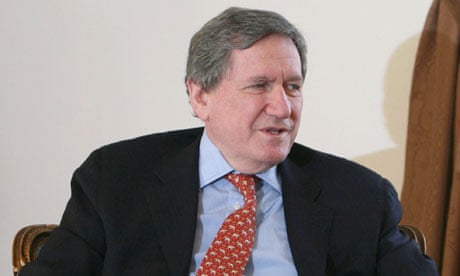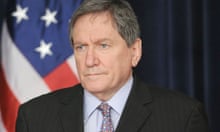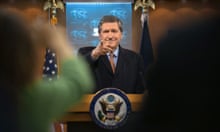Richard Holbrooke, who has died aged 69 after suffering a ruptured aorta, was not the most universally beloved, but was certainly one of the ablest, the most admired and the most effective of American diplomats. He is one of the few of that profession in the past 40 years who can be compared with the giants of the "founding generation" of American hegemony, such as Dean Acheson and George Kennan.
Holbrooke was tough as well as exceptionally bright. He was a loyal, liberal Democrat, but also a patriot who was prepared to be ruthless in what he saw as his nation's interest. To his friends, he was kind and charming, but he could be abrasive: no doubt that characteristic helped prevent him becoming secretary of state on two occasions, under Bill Clinton and again when Barack Obama became president.
He held almost every other important job in the international service of the US. He was ambassador to the United Nations, where he dealt with the vexed problem of America's debts to the organisation, and to Germany. He was the only person in history to be assistant secretary of state – the key level in routine diplomacy – in two regions of the world, Europe and Asia. He distinguished himself as an investment banker, a magazine editor, a charity executive and an author, but he will be remembered most of all for his success in negotiating an end to the war in Bosnia-Herzegovina at an Ohio airbase, and for his part in the American intervention in Kosovo. At the time of his death, he was Obama's special representative for Afghanistan and Pakistan.
Richard Charles Albert Holbrooke, generally known as Dick, was born in Manhattan. Though his parents were ethnic Jews, they had little sense of Jewish identity, and were atheists. His father, Dan, had been born in Warsaw of Russian-Jewish parents and in the 1930s came to the US, where he was a successful medical doctor. Dick's mother was the former Trudi Moos, a potter. She had first gone to Argentina as a refugee from Germany before moving to the US.
Dick was educated at Scarsdale high school, in New York's affluent Westchester county suburb, one of the most academically successful secondary schools in the US. His best friend there was David Rusk, son of Dean Rusk, later secretary of state to Presidents John F Kennedy and Lyndon Johnson. Dick's own father died when he was 15, and he went on to Brown University, the Ivy League college in Rhode Island. Graduating in 1962, he was influenced by Kennedy's call to young Americans to serve the nation.
Holbrooke joined the foreign service, and in 1963 was sent as a civilian official to Vietnam, where he was one of a talented cohort of young men who were to become leaders in American diplomacy, including John Negroponte, George W Bush's ambassador to Iraq and deputy secretary of state; Les Aspin, a future congressman and secretary of defence; and Anthony Lake, who became Clinton's national security adviser. Holbrooke worked for the infamous Robert Komer, who earned the sobriquet "Blowtorch Bob" for his work in the Phoenix "strategic hamlets" programme of forced resettlement.
Once back in Washington in 1966, Holbrooke worked for two years in the White House under Johnson, and then at the state department, where he was a junior member of the delegation to the fruitless initial peace talks with North Vietnam in Paris. He also wrote one volume of the famous Pentagon Papers, the government's secret history of its involvement in Vietnam, subsequently leaked to the New York Times and the Washington Post by Daniel Ellsberg. In 1970, probably aware that his Vietnam service might not be universally admired, Holbrooke asked to be sent to Morocco as director of the Peace Corps there.
By 1972, Holbrooke was ready for a change. He became the first editor of the magazine Foreign Policy, created as a less stuffy competitor to the august Foreign Affairs. He also worked for Newsweek magazine. In 1976, he went to work for Governor Jimmy Carter of Georgia, who was beginning his campaign for president and badly needed some foreign policy expertise.
When Carter became president, in 1977, Holbrooke became his assistant secretary of state for Asian affairs. He was charged by critics with protecting the Indonesian president, Suharto, from criticism by American human rights advocates over East Timor, but his most important work lay in completing the shift in American diplomatic relations from Taiwan to the People's Republic of China, formally recognised by the US from the start of 1979.
After the Republican Ronald Reagan became president in 1981, Holbrooke went to Wall Street. He became a consultant to, and later managing director of, the investment banker Lehman Brothers. At the same time he took on a good deal of pro bono work for the Carnegie Commission and other foundations interested in foreign policy. When Clinton became president in 1993, he appointed Holbrooke as his ambassador to Germany, where he initiated the important German-American institution, the American Academy in Berlin.
After a year in Berlin, he was brought back to Washington as assistant secretary of state for European affairs, and became passionately committed to the search for peace in the former Yugoslavia. He achieved a close relationship with the Serbian president, Slobodan Miloševic as well as with the equally intransigent Croatian leader, Franjo Tudman. He invited them and the Muslim leader Alija Izetbegovic to an isolated airbase near Dayton, Ohio, where in a brilliant display of "parallel diplomacy", negotiating separately with all parties, he achieved the accords that ended the fighting in Bosnia by devising a federal structure to accommodate Bosnian Serbs on the one hand, and Croatians and Muslims on the other. In order to do so he was willing to threaten Miloševic that the US would bomb his headquarters. He maintained that the Serbs had experienced nothing but military success, and would not come to the table unless they feared American military power.
With the concluding of the Dayton Peace Agreement on Bosnia-Herzegovina in November 1995, Holbrooke then announced that he had to go and get married. This was the third such occasion, his marriages to Larrine Sullivan, a lawyer, and Blythe Babyak, a television producer, having ended in divorce. His new bride was the television journalist Kati Marton, daughter of the Associated Press's White House correspondent, Endre Marton, and previously the wife of the television anchor Peter Jennings. Marton had been brought up as a Roman Catholic, but discovered that her grandparents were Jews and had died in Auschwitz.
Holbrooke resigned from government because he wanted to move back to New York with Kati, and went to work for Credit Suisse First Boston. The bank allowed him to act as President Clinton's representative, first to Cyprus in 1997, and later to Kosovo, where atrocities had been committed by Serbs on the Albanian majority. Extremely tough discussions followed, and when it proved impossible to reach agreement he lobbied within government for air strikes on Serbia. To give Miloševic a last chance of a negotiated settlement, he went to Belgrade for talks in the presidential palace. But no breakthrough was forthcoming, and so shortly afterwards Nato began the bombing campaign of March-June 1999 that resulted in Serbia's capitulation.
The following August, Holbrooke returned to public service as US ambassador to the UN. It had taken more than a year for his appointment to be confirmed, in part because he was accused of lobbying for Credit Suisse First Boston when engaged on government business. However, once he had been sworn in, he negotiated a crucial deal with the 188 other member nations. The US would pay its $900m debt, accumulated since President Reagan's attack on the UN, and in return dues were redistributed so that the US share was reduced.
After the Republicans won the 2000 presidential election and George W Bush became president, Holbrooke went back once again to the private sector, becoming a director of Human Genome Sciences, Inc. He also founded and remained president of the Global Business Coalition on HIV/Aids, whose activity was subsequently extended to deal with tuberculosis and malaria: it was an extremely effective NGO linking such powerful corporations as Coca-Cola, L'Oréal, Chevron and many more.
In 2009, President Obama made Hillary Clinton, whom Holbrooke had supported in her presidential campaign, secretary of state, while Holbrooke became his envoy to Afghanistan and Pakistan; she acknowledged her friend's "ability to shoulder the most vexing and difficult challenges".
Holbrooke's incandescent confrontations with the Afghan president, Hamid Karzai, became legendary. On 21 August 2009, Holbrooke accused Karzai to his face of having rigged the Afghan elections. Though officials denied details of the showdown, it is clear that Holbrooke's relation with Karzai broke down totally in a shouting match.
Subsequently his influence waned. He was deeply committed to improving relations with Pakistan, which he saw as the key to the Afghan situation. But when floods devastated Pakistan last July, he insisted that relief must come as the first priority, ahead of putting pressure on the Pakistan government to do more to root out jihadis from its tribal area, the policy issue on which he had put maximum pressure before the humanitarian issue arose.
Last Friday, at a meeting with secretary of state Clinton, he fell ill. After he arrived at George Washington University hospital, Washington, he underwent prolonged surgery, and remained in a critical condition till his death.
He is survived by Kati, his two sons, David and Anthony, from his first marriage, and his brother, Andrew.




